You are unique. You are like a one-of-a-kind puzzle. This means when you have a health imbalance such as autoimmune disease, the circumstances of your illness and root causes will also be unique; and so will the solution to rebalance you (or reverse your autoimmunity).
When solving any puzzle, we start with finding the four corner pieces to anchor in the borders. What are the four corner pieces of the autoimmune puzzle? The root causes of autoimmune disease: childhood trauma, genetics, toxins, and leaky gut.
I call childhood trauma the missing piece of the autoimmune puzzle. The other three pieces are now widely known thanks to the pioneering work of Dr. Alessio Fassano. Fassano identified three root causes to autoimmune disease: genetics, environmental toxins, and leaky gut. Most functional medicine providers are aware of these root causes and focus on them in their protocols. Yet people are still falling through the cracks and getting frustrated. Focus on the three root causes is good, but it’s not enough.
In my practice, I see time and again that supplements and diets are not ending autoimmunity. On a daily basis, I see angry people who follow these protocols prescribed by their doctors, believe they are “doing everything right” with their diets, take the supplements they have been ordered, and yet feel that the ice they are standing on is melting as their diets get more and more restricted and good health eludes them. I recently had a woman in my office who cried as she told me she was down to eating only five foods. “My world is shrinking,” she sobbed.
Naturally, when we talk about leaky gut, genetics, and environmental toxins, we talk about stress. However, it is in a rather off-handed way. It’s not getting to the core of why people hold onto their immune reactivity. The immune system will mirror the mental system. If the mind is reactive, the immune system will follow. Is there any science to prove this? Yes. There are several studies, but I am going to focus on one in particular: the ACE (Adverse Childhood Experiences) study.
The ACEs Study
The Adverse Childhood Experiences Study (ACEs Study) was conducted by the Centers for Disease Control and Prevention (CDC) and Kaiser Permanente between 1995 and 1997.
In the 1980s, in spite of the fact that the participants at Kaiser Permanente’s obesity clinic were all successfully losing weight, about 50% were dropping out. This was confusing to the founder of the Department of Preventive Medicine for Kaiser Permanente, Vincent Felitti. Dr. Felitti interviewed many of the people who had left the program and discovered that a majority of the 286 people he interviewed had experienced childhood sexual abuse. These conversations revealed to Felitti that weight gain could be less about food and hunger and more about coping with depression, anxiety, and fear.
Dr. Robert Anda of the CDC joined Felitti and went on to survey childhood trauma experiences of over 17,000 Kaiser Permanente patient volunteers. Of the 17,337 study participants, half were female. (Three-fourths of the total were white with an average age of 57 and college educated.) All had jobs and good healthcare. They were asked about distressing childhood experiences, including abuse and neglect. The 10 items that were covered were:
- Physical abuse
- Sexual abuse
- Emotional abuse
- Physical neglect
- Emotional neglect
- Mother was treated violently
- Household substance abuse
- Household mental illness
- Parental separation or divorce
- Incarcerated household member
If one of the 10 items applied to a participant, it counted as a “1,” or an ACE score of “1.” If a participant reported 2 adverse events, she had an ACE score of “2,” and so on.
ACEs Study Findings
Dr. Felitti is reported to have broken down and wept when he saw the results of the survey. Over 2/3 of the study participants reported an ACE score of one or more. Of these, 87% reported at least one more ACE. A staggering 40% of the participants reported two or more ACEs, and 12.5% experienced four or more. Some participants experienced divorced parents or had an absent or addictive caregiver. Twenty-eight percent were physically abused and 21% sexually abused.
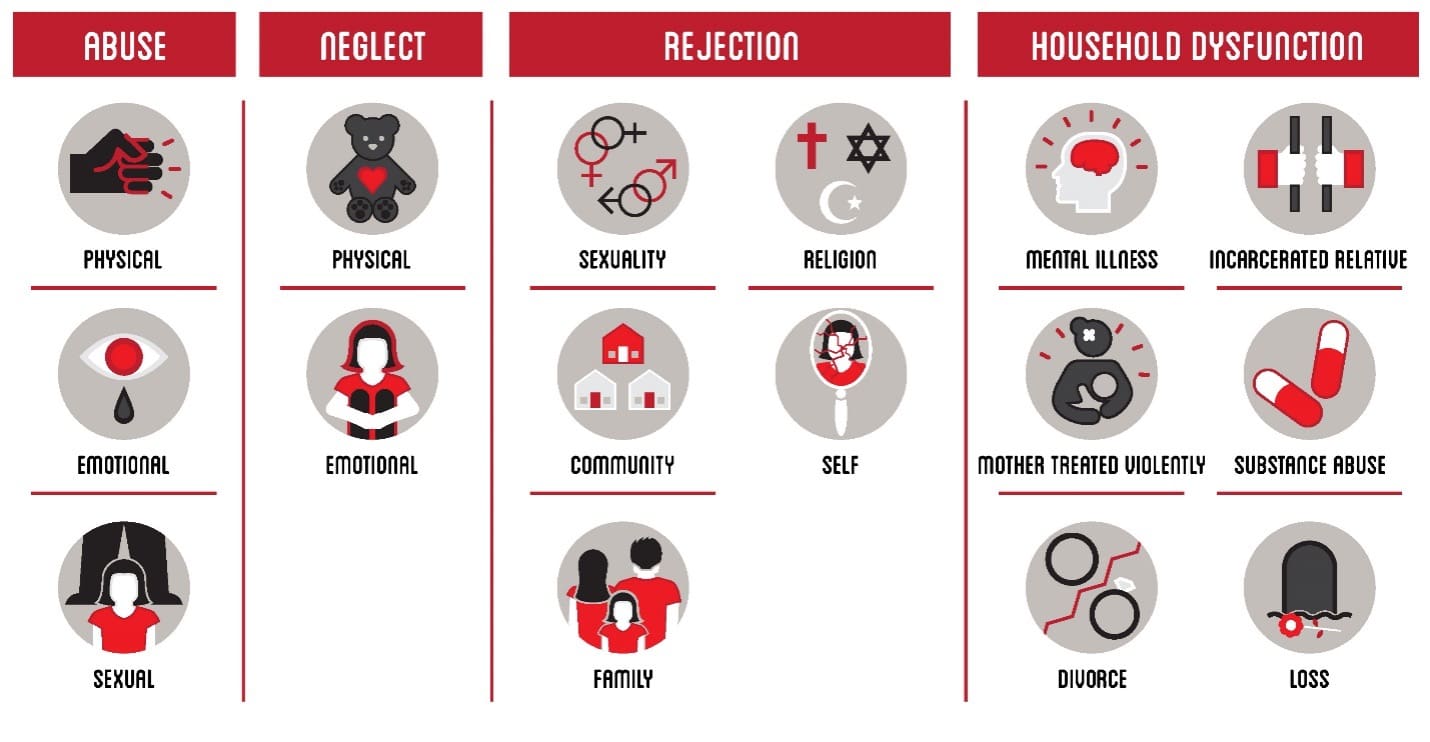
Figure: Examples of abuse and neglect
Compared to an ACEs score of zero, having four or more ACEs creates a seven-fold increase in alcoholism, doubles the risk of cancer, and quadruples the incidence of emphysema. An ACEs score over six creates a 30-fold increase in attempted suicide.
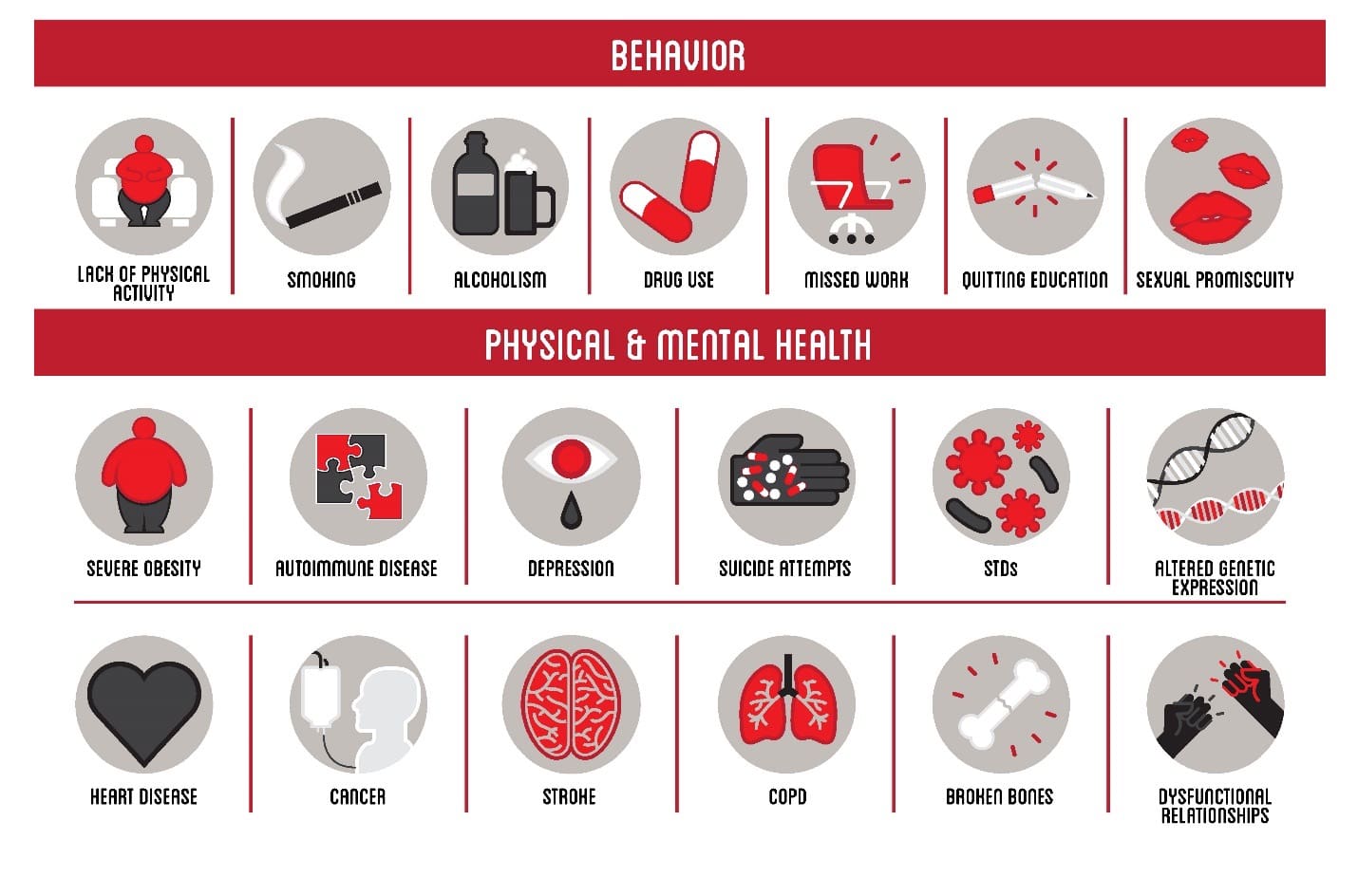
Figure: Risk factors of ACEs
The study found that the higher the ACEs score, the higher the risk for developing chronic disease and other health-related issues: autoimmune disease, heart disease, cancer, diabetes, depression, addiction(s), suicide, social issues, high-risk health behaviors, obesity, and behavioral problems. In other words, what happened in their childhood continued to have an impact into adulthood and throughout the shortened life spans of these initial volunteers. Indeed, the ACE study’s results indicate that mistreatment and household dysfunction in the early years contribute to the most common causes of death and disability decades later. A further shocking finding of this study: adverse childhood experiences are all too common. (This has been verified in subsequent studies using different screening tools.)
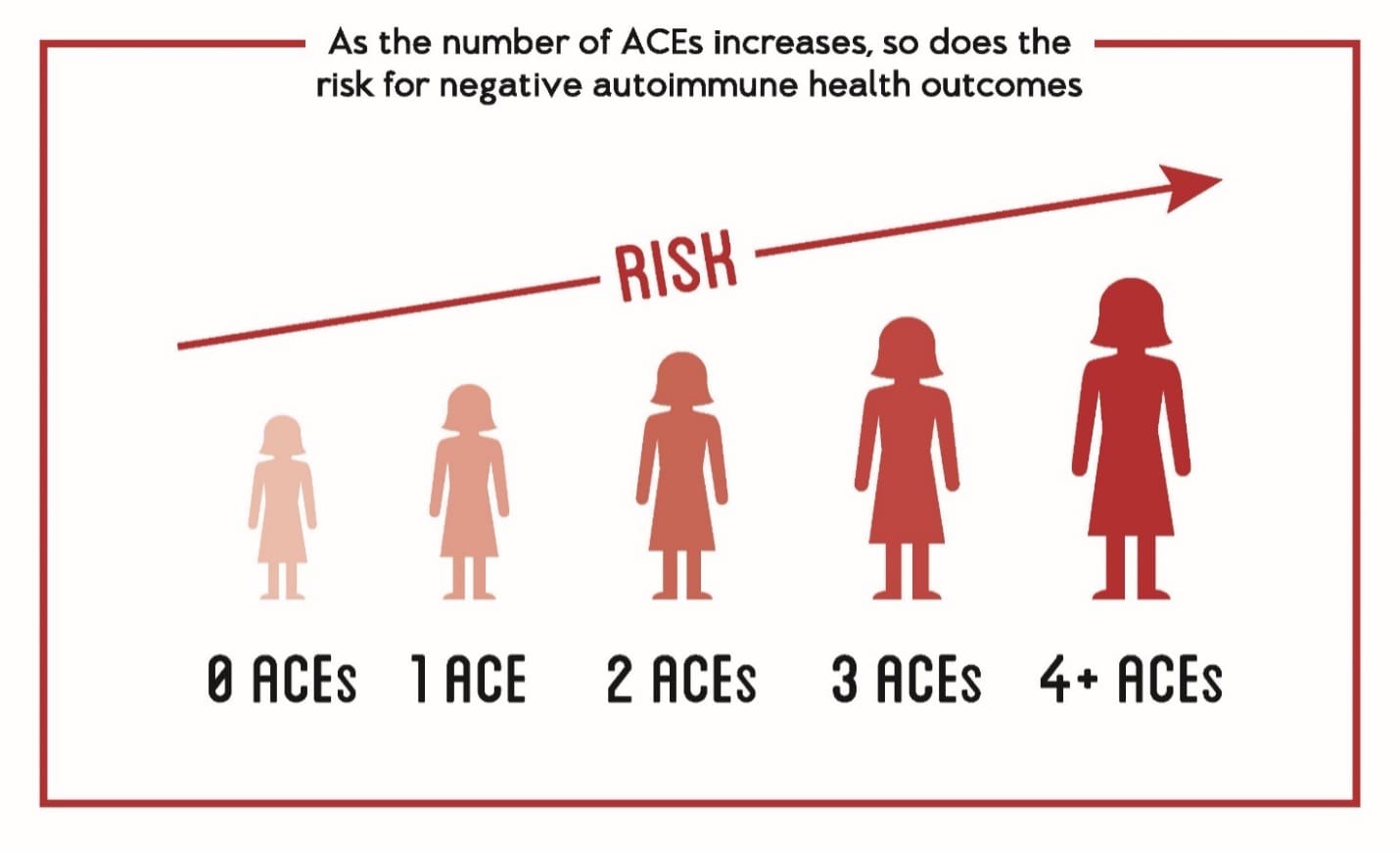
Figure: The higher the ACEs, the higher the risk for autoimmune (and other chronic) disease
The ACEs Quiz
An ACE score is the total of 10 different types of abuse, neglect, and household dysfunction. The ACE quiz is by no means exhaustive, with the glaring absence of death and loss. However, it does correlate early distressing events from childhood with adult chronic illness like autoimmune disease. According to the Adverse Childhood Experiences study, the tougher your childhood, the higher your score is likely to be, and the higher your risk for later chronic disease and even a shortened life span.
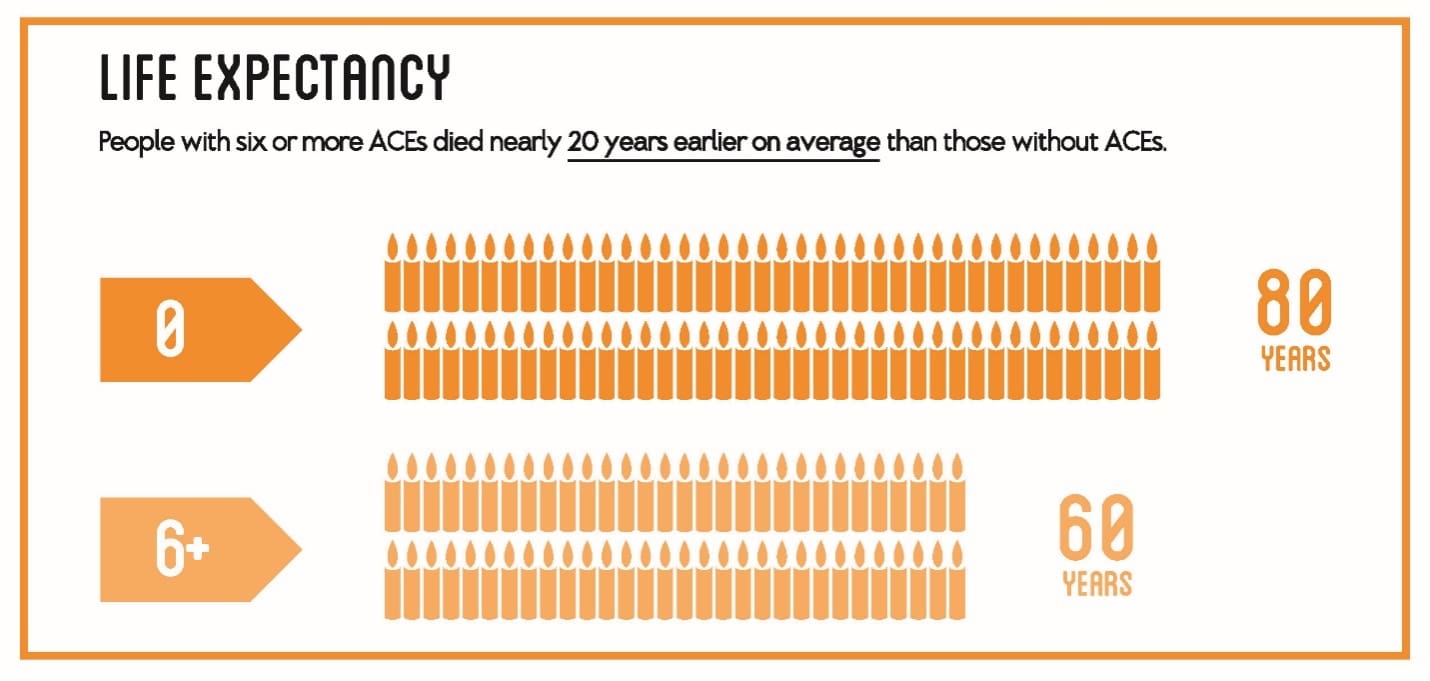
Figure: The higher the ACEs, the lower the life span
Here is the test if you would like to know your own ACE score.
1. Before your 18th birthday, did a parent or other adult in the household often or very often…
swear at you, insult you, put you down, or humiliate you?
or act in a way that made you afraid that you might be physically hurt?
YES / NO
2. Before your 18th birthday, did a parent or other adult in the household often or very often…
push, grab, slap, or throw something at you?
or ever hit/spank you so hard that you had marks or were injured?
YES / NO
3. Before your 18th birthday, did an adult or person at least five years older than you ever…
touch or fondle you or have you touch their body in a sexual way? or attempt or actually have oral, anal, or vaginal intercourse with you?
YES / NO
4. Before your eighteenth birthday, did you often or very often feel that…
no one in your family loved you or thought you were important or special?
or your family didn’t look out for each other, feel close to each other, or support each other?
YES / NO
5. Before your 18th birthday, did you often or very often feel that…
you didn’t have enough to eat, had to wear dirty clothes, and had no one to protect you?
or your parents were too drunk or high to take care of you or take you to the doctor if you needed it?
YES / NO
6. Before your 18th birthday, was a biological parent ever lost to you through divorce, abandonment, or other reason?
YES / NO
7. Before your 18th birthday, was your mother or stepmother:
often or very often pushed, grabbed, slapped, or had something thrown at her?
or sometimes, often, or very often kicked, bitten, hit with a fist, or hit with something hard?
or ever repeatedly hit over at least a few minutes or threatened with a gun or knife?
YES / NO
8. Before your 18th birthday, did you live with anyone who was a problem drinker or alcoholic, or who used street drugs?
YES / NO
9. Before your 18th birthday, was a household member depressed or mentally ill, or did a household member attempt suicide?
YES / NO
10. Before your 18th birthday, did a household member go to prison?
YES / NO
Your ACEs Score Impacts Your Level of Self-Care
One of the most compelling findings I discovered in the data from the ACEs study findings was the higher the ACEs score, the lower the likelihood for the desire to engage in self-care and the higher the level of self-neglect.
Self-neglect is a pattern I see in a lot of people with autoimmune disease. I certainly was guilty of it myself. When I say self-neglect, I am referring to taking time for real self-care. I exercised every day (to an extreme), took a shower, dressed nicely, ate three meals a day, etc. However, I did not put myself at the top of the list for making sure I had enough quiet time for self-inquiry. Self-inquiry and self-confrontation are what build self-awareness. Self-awareness leads to the ability to progress developmentally and lowers emotional and mental reactivity. Remember that a rigid mind leads to a rigid body and immune system. Or another way I like to say this, “What’s in your head goes to your bed.” Check in with yourself and make sure you are spending plenty of time each day in self-inquiry. It will allow you to break free of patterns such as emotional over-eating, self-sabotaging behaviors, and outright self-neglect.
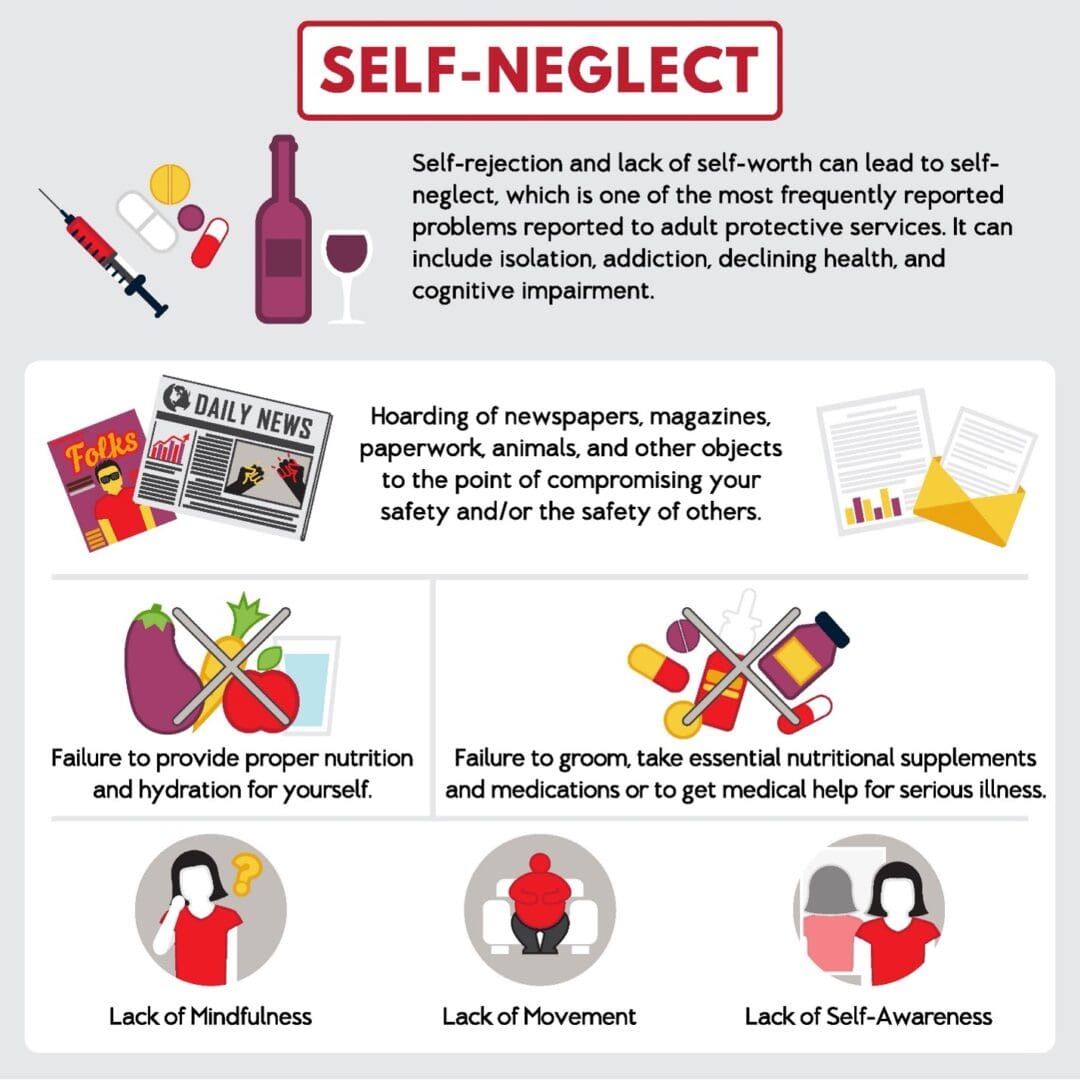
Take the Self-Care Questionnaire and see how willing you are to engage in self-care. Remember that a high level of self-care is essential in the reversal of autoimmunity. Take some time in self-confrontation and self-inquiry and map out your next steps in taking charge of your own health.
Self-Care Questionnaire
Research shows that people who take time to recharge and restore are more creative, happier, and more successful. This questionnaire will help you identify the areas of your life that are well-tended, and those that could use more time and attention. This is not meant to be a diagnostic assessment. Instead, it is a tool to help you see what you are doing to care for yourself. There are no right or wrong answers to these questions, and some of them may require a bit of thought. Take your time and answer each question to the best of your ability based on your self-care practices right now.
___________________________________________
For the following questions, please rank each item on a scale of 0–5.
0 – Never 1 – Rarely 2 – Sometimes 3 – Often 4 – Regularly 5 – Always
PHYSICAL WELLBEING—How often do you:
- Eat a whole foods-based diet rich in colorful fruits and vegetables? 0 1 2 3 4 5
- Drink enough water? 0 1 2 3 4 5
- Exercise for more than 20 minutes? 0 1 2 3 4 5
- Wake feeling refreshed from sleep? 0 1 2 3 4 5
- Sleep at least 7 hours per night? 0 1 2 3 4 5
- Make time to relax or nap? 0 1 2 3 4 5
- Take time to breathe deeply throughout the day? 0 1 2 3 4 5
- Engage in stress-reducing activities (excluding TV or screen time)? 0 1 2 3 4 5
- Spend time in nature? 0 1 2 3 4 5
- Feel nourished, healthy, and strong? 0 1 2 3 4 5
MENTAL/EMOTIONAL/SPIRITUAL WELLBEING—Do you:
- Make time to participate in things you enjoy? 0 1 2 3 4 5
- Give and receive affection regularly? 0 1 2 3 4 5
- Feel understood and valued by those who are close to you? 0 1 2 3 4 5
- Feel gratitude on a daily basis? 0 1 2 3 4 5
- Find meaning in life even during difficult times? 0 1 2 3 4 5
- Take an interest in or find joy in the world around you? 0 1 2 3 4 5
- Have hope that things will get better? 0 1 2 3 4 5
- Express yourself creatively? 0 1 2 3 4 5
- Treat yourself with kindness? 0 1 2 3 4 5
- Remember to make your dreams and goals a priority? 0 1 2 3 4 5
PROFESSIONAL LIFE/WORK/CAREER—Do you:
- Hold a work position in an area of your interest? 0 1 2 3 4 5
- Work in a position that matches your professional goals? 0 1 2 3 4 5
- Find a sense of meaning and enjoyment in your work? 0 1 2 3 4 5
- Empathize and connect with customers, clients, and work colleagues? 0 1 2 3 4 5
- Have confidence in your ability to address challenges in your professional life? 0 1 2 3 4 5
- Feel supported at work or in your professional life? 0 1 2 3 4 5
- Have someone you can rely on if you need help or guidance? 0 1 2 3 4 5
- Set limits at work, whether it be with clients or tasks? 0 1 2 3 4 5
- Disengage and leave pressures behind at the end of the day? 0 1 2 3 4 5
- Take vacation or holiday breaks to allow for some down time? 0 1 2 3 4 5
SOCIAL LIFE/FAMILY/RELATIONSHIPS—Do you:
- Have a dependable person who listens to you? 0 1 2 3 4 5
- Have supportive family and friends close by? 0 1 2 3 4 5
- Get enough social time with people who make you happy? 0 1 2 3 4 5
- Participate in group activities with people who share a common interest? 0 1 2 3 4 5
- Spend time with people who make you laugh? 0 1 2 3 4 5
- Feel like your close relationships are loving and supportive? 0 1 2 3 4 5
- Have the ability to comfortably say no? 0 1 2 3 4 5
- Do something fun with family or friends at least once a week? 0 1 2 3 4 5
- Feel like your personal life brings balance to your professional life? 0 1 2 3 4 5
- Feel comfortable asking for help when you need it? 0 1 2 3 4 5
_________________________________________________
Rating Scale
The higher the score, the better you may be at taking time for self-care and wellness in each aspect of your life. Trying to improve your scores can help create more balance in your life. Consider items on which you scored 3 or lower. How can you modify your behavior to improve your self-care practices?
What goals might you need to set to make these changes?
_____________________________________________________________________________________
_____________________________________________________________________________________
Healing trauma as the missing piece of the autoimmune puzzle is essential for autoimmune reversal and the elimination of self-sabotaging behaviors that get in the way of your own self-care, self-compassion, and self-healing.
*Therapies offered in packages in our practice include EMDR therapy, Brain Spotting, Somatic therapy, Attachment-Informed methods, Cognitive therapy, Internal Family Systems/Parts work, the Enneagram, MDMA Assisted psychotherapy, and Expressive methods to help you experience relief. Alternatively, you can begin by engaging in the online healing program called Healing Trauma Through the Chakra System.